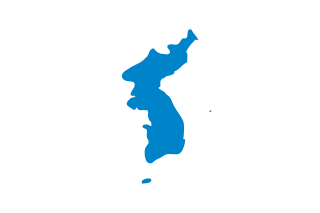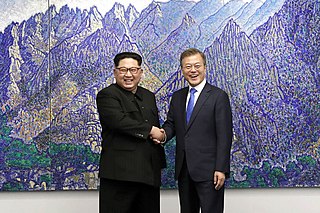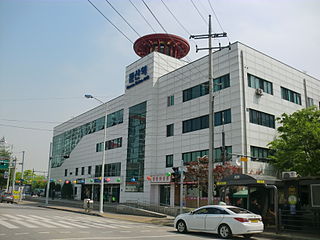| Lee Jae-joung | |
| Hangul | 이재정 |
|---|---|
| Hanja | |
| Revised Romanization | I Jaejeong |
| McCune–Reischauer | Ri Chaejŏng |
Lee Jae-joung (born March 1,1944) was the Unification Minister of South Korea. As head of the Ministry of Unification,Lee is tasked with working toward the reunification of Korea.
Lee assumed the position of Minister for Unification,taking over from Lee Jeong-suk (now a Senior Fellow at the Sejong Institute and Member of the Presidential Advisory Group on the Inter-Korean Summit) in December 2006. The appointment made him the 33rd Minister for Unification,and in the intense prelude to the second inter-Korean Leader's Summit of 2–4 October 2007,the appointment also made him a regular figure in the Korean-language media.

The history of South Korea begins with the Japanese surrender on 2 September 1945. At that time, South Korea and North Korea were divided, despite being the same people and on the same peninsula. In 1950, the Korean War broke out. North Korea overran South Korea until US-led UN forces intervened. At the end of the war in 1953, the border between South and North remained largely similar. Tensions between the two sides continued. South Korea alternated between dictatorship and liberal democracy. It underwent substantial economic development.

Korean reunification is the hypothetical unification of North Korea and South Korea into a singular Korean sovereign state. The process towards reunification of the peninsula while still maintaining two opposing regimes was started by the June 15th North–South Joint Declaration in June 2000, was reaffirmed by the October 4th Declaration in October 2007 and the Panmunjom Declaration in April 2018, and the joint statement of United States President Donald Trump and North Korean leader Kim Jong Un at the Singapore Summit in June 2018. In the Panmunjom Declaration, the two countries agreed to work to officially end the Korean conflict in the future.
The Sunshine Policy is one of the approaches for South Korea's foreign policy towards North Korea, lasting from 1998-2008 and again from 2017-2020.

Chung Dong-young is a politician and was the United New Democratic Party nominee for President of South Korea in 2007.

Formerly a single nation that was annexed by Japan in 1910, the Korean Peninsula has been divided into North Korea and South Korea since the end of World War II on 2 September 1945. The two governments were founded in the two regions in 1948, leading to the consolidation of division. The two countries engaged in the Korean War from 1950 to 1953 which ended in an armistice agreement but without a peace treaty. North Korea is a one-party state run by the Kim family. South Korea was formerly governed by a succession of military dictatorships, save for a brief one-year democratic period from 1960 to 1961, until thorough democratization in 1987, after which direct elections were held. Both nations claim the entire Korean Peninsula and outlying islands. Both nations joined the United Nations in 1991 and are recognized by most member states. Since the 1970s, both nations have held informal diplomatic dialogues in order to ease military tensions.

Inter-Korean summits are meetings between the leaders of North and South Korea. To date, there have been five such meetings so far, three of them being in Pyongyang, with another two in Panmunjom. The importance of these summits lies in the lack of formal communication between North and South Korea, which makes discussing political and economic issues difficult. The summits' agendas have included topics such as the ending of the 1950-53 war, the massive deployment of troops at the DMZ, the development of nuclear weapons by North Korea, and human rights issues.

Munsan Station (Korean: 문산역) is a railway station on the Gyeongui–Jungang Line. It is notable for being the closest station on the Seoul Metropolitan Subway to the border with North Korea that is open for passenger service, only a few kilometers away.

Hyun In-Taek is a South Korean politician. He was Minister of Unification of South Korea from January 2009 til August 2011. He was replaced with Yu Woo-ik. As the Minister of Unification, he oversaw matters related to South Korea’s policies toward North Korea, inter-Korean affairs, unification of the two Koreas, and public education on unification.

Moon Jae-in is a South Korean politician who served as the 12th president of South Korea from 2017 to 2022. Prior to his presidency, he served as Senior Secretary for Civil Affairs and Chief of Staff to President Roh Moo-hyun, Member of the National Assembly, and Leader of the Democratic Party of Korea.
Park Jae-kyu is the president of Kyungnam University in Masan, South Korea, and the former Unification Minister and National Security Council Chairman of South Korea.

The King 2 Hearts is a 2012 South Korean television series, starring Ha Ji-won and Lee Seung-gi in the leading roles. It is about a South Korean crown prince who falls in love with a North Korean special agent. The series aired on MBC from March 21 to May 24, 2012, on Wednesdays and Thursdays at 21:55 for 20 episodes.
The July 4 South–North Joint Statement, also known as the July 4 South–North Joint Communiqué, was the first joint statement by the governments of South Korea and North Korea, signed on July 4, 1972. The signatories of the statement were Lee Hu-rak and Kim Yong-ju, who represented the delegations from the south and north, respectively.

Kim Song-hye is a North Korean politician. As the head of the Secretarial Bureau of the Committee for the Peaceful Reunification of the Fatherland (CPRK), she has taken part in numerous negotiations between North and South Korea. She has participated in talks at the 2000 inter-Korean summit, the 15th and 16th North–South Ministerial Talks in 2005, the 2007 inter-Korean summit, and most notably the inter-Korean working level talks of 2013 where she headed the North Korean delegation.

Chung Eui-yong is a South Korean diplomat and a politician who served as Minister of Foreign Affairs from 2021 to 2022. Chung was previously President Moon Jae-in's first Director of National Security from 2017 to 2020.

The April 2018 inter-Korean summit took place on 27 April 2018 on the South Korean side of the Joint Security Area, between Moon Jae-in, President of South Korea, and Kim Jong Un, Chairman of the Workers' Party of Korea and Supreme Leader of North Korea. The summit was the third inter-Korean summit - the first in eleven years. It was also the first time since the end of the Korean War in 1953 that a North Korean leader entered the South's territory; President Moon also briefly crossed into the North's territory.

Suh Hoon is a South Korean government official who served as the Director of National Security Office from 2020 to 2022 and previously as the director of the National Intelligence Service from 2017 to 2020.

The Panmunjom Declaration for Peace, Prosperity and Reunification of the Korean Peninsula was adopted between the Supreme Leader of North Korea, Kim Jong-un, and the President of South Korea, Moon Jae-in, on 27 April 2018, during the 2018 inter-Korean Summit on the South Korean side of the Peace House in the Joint Security Area.

The Peace Treaty on Korean Peninsula is a proposed settlement to formally end military hostilities on the Korean Peninsula as a follow-up to the 1953 Korean Armistice Agreement implemented by the United Nations after the Korean War. During the inter-Korean summit on April 27, 2018, Kim Jong-un and Moon Jae-in signed the Panmunjom Declaration; the declaration involved an agreement about mutual efforts and action items for transforming the armistice agreement into a peace treaty with the cooperation of the United States and China. During the 2018 Trump–Kim summit, US president Donald Trump and Kim signed a Joint Statement which reaffirmed the Panmunjom Declaration. On November 23, 2023, North Korea terminated its 2018 agreement with South Korea.

The May 2018 inter-Korean summit was the second inter-Korean summit in 2018. On 26 May, North Korean state chairman Kim Jong Un and South Korean president Moon Jae-in met again in the joint Security Area, this time on the North Korean side in the Inter-Korean Peace House in the Unification Pavilion. The meeting took two hours, and unlike other summits it had not been publicly announced beforehand. Photos released by South Korea's presidential office showed Moon arriving at the northern side of the Panmunjom truce village and shaking hands with Kim's sister, Kim Yo-jong, before sitting down with Kim for their summit. Moon was accompanied by Suh Hoon, Director of the National Intelligence Service of South Korea, while Kim was joined by Kim Yong-chol, a former military intelligence chief who is now a vice chairman of the North Korean ruling party's central committee tasked with inter-Korean relations. The meeting was largely centered around North Korean leader Kim Jong Un's upcoming summit with US President Donald Trump. Kim and Moon also embraced before Moon returned to South Korea. On 27 May, Moon stated in a public address that he and Kim agreed to meet again at "anytime and anyplace" without any formality and that the North Korean leader once again pledged to denuclearize the Korean Peninsula in accordance with the Panmunjom Declaration.

The Inter-Korean Liaison Office (Korean: 남북공동연락사무소) was a joint liaison office of North Korea and South Korea located in North Korea's Kaesong Industrial Region.